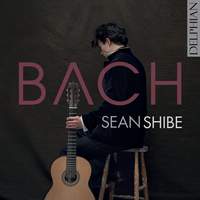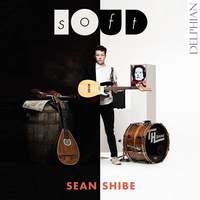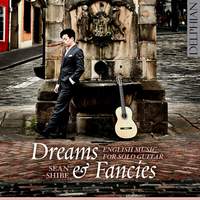Interview,
Sean Shibe on Bach
 The Scottish guitarist Sean Shibe’s first two recordings on Delphian received stellar reviews and multiple award-nominations, and his third and final album for the label (an all-Bach programme, which was one of our Recordings of the Week last month) looks set to follow in their footsteps: Gramophone praised his ‘energy, reflection, eclecticism, integration and emotional candour’ and The Guardian ‘the sheer intelligence and eloquence of his musicianship’ in three suites composed 'Pour la Luth Ò Cembal'.
The Scottish guitarist Sean Shibe’s first two recordings on Delphian received stellar reviews and multiple award-nominations, and his third and final album for the label (an all-Bach programme, which was one of our Recordings of the Week last month) looks set to follow in their footsteps: Gramophone praised his ‘energy, reflection, eclecticism, integration and emotional candour’ and The Guardian ‘the sheer intelligence and eloquence of his musicianship’ in three suites composed 'Pour la Luth Ò Cembal'.
It was a tonic to catch up with Sean (whose conversation is every bit as emotionally candid and eclectic as his music-making) over FaceTime a few weeks ago to discuss the challenges and rewards of performing these works on the guitar, why he was so keen to record Bach in his twenties, and the people who’ve inspired him in this repertoire…
When and where did you record the album?
It was recorded in Crichton Kirk in Midlothian in May and December last year. Building in a bit of breathing-space between the sessions is something I’ve always done deliberately, and it helps so much: it just provides an extra bit of perspective, and time to ruminate on things. I don’t like to rush.
Were there any specific experiences in between the sessions which helped to provide that 'extra bit of perspective'?
I think there were, but they were quite abstract: I couldn’t point to any one thing in particular. There were a couple of figures who were really important to this disc, though, and just spending a bit more time with those people was really edifying. It became much more of a personal journey than just a musical or technical one – which is true of every disc, of course, but the whole process just felt much more cathartic here than it ever has before. I remember that when I was making softLOUD my approach was very much ‘OK, I know exactly what I’m doing: let’s go in and smash it, make the disc and get it out there’, whereas this time around I was a tearful mess! It’s easier to imagine the end of the world than to imagine the end of exploring Bach!
Were any of those important figures you mention fellow musicians or teachers?
One person who comes to mind is Laurence Dreyfus, the musicologist and founder of Phantasm. We first met in 2017, when we shared a concert together in Blythburgh Church as part of the Aldeburgh Festival; he was doing selections from The Art of Fugue, and I was playing solo lute suites. I was already so deeply in love with Phantasm’s sound: to my ears they just knock the other viol consorts out of the water, and so much of that is down to Larry’s artistic and academic leadership and aesthetic ambition. He’s essentially trained many of the members that he brings into the Phantasm fold, and whilst he's steeped in the academic rigour of early music performance he’s not somebody who shies away from expressiveness for historical reasons, which I found very liberating. We didn’t swap any contact-details, but the next day I went back to Goodenough College where I was living at the time and found that he happened to be staying there for a few days; we met coincidentally at breakfast and spent a couple of hours together.
Aside from the musical aspect of things, he also struck me as somebody who simply has such a deep humanity. When our paths first crossed I was hurtling towards 21, and career-wise everything felt like an uphill struggle: the instrument that I was playing was fighting against me, I was between teachers, and also grappling with all kinds of more ephemeral questions about the kind of aesthetic I wanted to set out as a guitarist. I felt (and still do feel) that the classical music world is very competitive in a way that it wasn’t fifty years ago: there’s less money in it, and it’s a far cry from the golden age where you could take six months out, practise your programme, spend six months touring it and then make a killer recording.
Establishing a career now is a real baptism of fire, especially with the plethora of competition-circuits that have sprung up, and in the midst of all of that noise Larry’s generosity really shone through: he taught me that you don’t want to hold your cards close to your chest, and that giving everything that you have to give is its own reward. We spent probably three or four sessions together, where I’d play something and he’d share his ideas - some of which I agreed with and some of which I didn’t, but many of them radically altered pieces which I’d known and played for quite some time. What I'd initially looked on as the end of a journey with these pieces – or at least as the end of my naïve, youthful journey with them - very quickly became the beginning of something else as well.
When exactly did that journey begin for you?
I’ve been playing these pieces for maybe twelve or thirteen years - and even though recording is not as profitable as it once was, I do feel there’s still value in putting down a recording at this stage in my career, when I have certain qualities to offer that I may not have in fifteen, twenty, or thirty years’ time. I already feel like I’m gradually mellowing: I don’t think I’m as bombastic in my use of colour as I used to be, and I wanted to preserve and record whatever approach or interpretation I have right now and enjoy for its own sake. I really enjoy something which Philip Higham said in an interview about his Bach Cello Suites on Delphian: Kate Molleson asked him why he’d chosen to record them at such a young age, and he said ‘The longer I live with these pieces, the more weighty the responsibility to record them.’
You could effectively divide what we refer as the Lute Suites into two camps: the first is BWV 995 and 1006a, which were originally bowed string repertoire, and the rest are texturally thicker adaptations of keyboard works. These are generally heavily contrapuntal, in three or four voices, and they require a degree of technical mastery that the others don’t: they’re absolutely hand-breaking in places! For this project I purposely chose to go with the most difficult suites that I knew.
Did you prepare your own editions of the Suites for this recording, or work from existing manuscripts?
There are a couple manuscripts available for each of the suites here; what I’ve created is probably closest to Tilman Hoppstock’s arrangements, with alterations of my own. But I should emphasise that these manuscripts are all so close to one other that the differences between editions are really a matter of one or two notes: the discrepancies that do exist among the various autograph manuscripts are so slight that there are pretty canonical solutions to the problems that arise.
I can’t speak with any authority as to how radically they differ in comparison to versions for other instruments, but there’s no madness like the pedal being altered to something in the treble. More than anything else it’s a matter of resonance, and I think that in recording you can sort of trick the listener into finding certain resonances that aren’t actually there - though obviously with something as delicate as Bach, you also discover that you’re vulnerable in other places that you may not have anticipated once you get into the studio.
Which other interpreters (whether harpsichordists or guitarists) have given you food for thought when it comes to approaching this music?
There’s a certain stability about what Gustav Leonhardt does which I find really comforting, but not always deeply moving; and in terms of recordings by other guitarists, I enjoyed Stephan Schmidt’s recording on Naïve from the 1990s. The guitar has its own technical issues in this music that need to be overcome, and sometimes tempi that would feel instinctive on a keyboard instrument don't necessarily translate well to the guitar. When I listen to guitarists from the time of Bream or Segovia, the speeds that they are required to take because of that technical deficit are speeds that are actually unmusical: take something like the Fugue from BWV 997, which is meant to be a gigue, but comes out as some sort of obscene Largo on a lot of historical recordings by guitarists.
And that brings me onto my second reason for wanting to make this recording: as well as feeling that I had something unique to say about these pieces right now, I also wanted to achieve things that I thought were missing from every other recording I’ve heard. I think a lot of that stems from the misunderstanding that these works were originally conceived for the lute, and the ensuing misconception that if we’re going to imitate the lute as a guitarist then we should play close to the bridge and with nail only so it has a harsh brittle sound – that’s actually so very distant from what the lute really sounds like! I was very clear that I wanted to avoid that sort of aggressive approach, which again is something that Larry really helped me to overcome.
In terms of venues and programming, what works best for you with Bach?
I find that these pieces don’t work in large spaces: 250 to 500 seats is ideal. Wigmore Hall is the exception, thanks to its miraculous, unique architecture, but other venues of a similar size aren’t really feasible.
The tenor Ben Johnson and I did quite an extensive tour of Ireland in November, where the programme also included a mixture of new commissions, Britten, and other folksongs. I did some of the Scottish lute repertoire from soft:LOUD alongside the most folky and rambunctious of the Bach suites, and highlighting the folk elements of these pieces - which are essentially explosions of cosmopolitanism – was great fun.
'This astonishing and adventurous guitarist...plays with such depth of tone, colour and intricacies of touch that it is as though he’s at a harpsichord, not strumming or plucking fretted strings...Shibe’s music-making is masterful, beautiful and convincing in every way. (The Times)
Available Formats: CD, MP3, FLAC, Hi-Res FLAC
'Like Julian Bream before him, Shibe has a natural yet creative rapport with 17th-century lute music…Both refract the music through a generous soundworld that demands you savour every note' (BBC Music Magazine)
Available Formats: CD, MP3, FLAC, Hi-Res FLAC
'It's not often a guitar recital leaves me slightly stunned, but this one did. Just listen to the sound, the way Shibe changes the colour even during a phrase...If you only by one guitar recital this year - it's called Dreams & Fancies.'
Available Formats: CD, MP3, FLAC, Hi-Res FLAC





